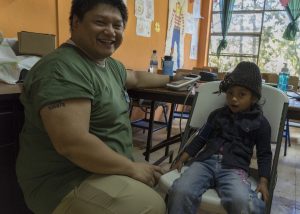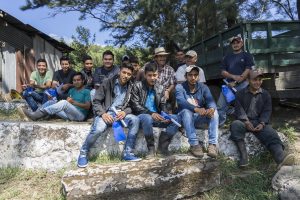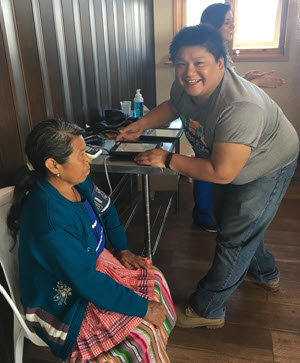True Life: I Work on a Coffee Farm
It was halfway through the first day of Bridge of Life (BOL)’s chronic kidney disease (CKD) screening event at Bella Vista Farm in Antigua, Guatemala, when it dawned on me—“I thought I knew, but I had no idea.” Yes, it was an episode of MTV’s True Life. For those of you who aren’t familiar with it, True Life is a long-running television show which documents specific life experiences and the people living them. This week’s episode was titled, “True Life: I Work on a Coffee Farm.”
Uncertainty is a catalyst for speculation. This being my first shot at world health services, my expectations from a medical mission like this one weren’t specific. I had created wonderful stories in my head of how simple and scientific this trip was going to be. CKD is an epidemic in this region, and we were going to gather data and get to the bottom of it. And, on the way, we’d help educate and treat those in need. Sounds easy, doesn’t it? I mean, I like helping people. The idea of simple was eviscerated when I began taking vitals for the first of many coffee workers’ children.
I asked the first child, “Wait, you’re 15?” He replied, “Yes.” With a smile, I asked if he was just hanging out with his mother or father today. He replied, “No,” which led me to ask, “Do you work here?” The boy looked at me, smiled and said proudly, “Yes!” My next question was, “For how long?” “Three Years,” was his response. I was completely naïve to the idea that it was commonplace for people in this area to begin working on a farm at such a young age. At 15, I was attending high school, and the only labor I endured was taking out the trash, cleaning my room and washing dishes from time to time.
I also encountered a young man who asked me about my Star of Life tattoo on my right arm. The man asked if I was a firefighter, and I replied, “Yes, a volunteer.” The young man’s face lit up: I symbolized something to him, which filled him with pride. He, too, was a volunteer firefighter, but in Alotenango. And on this day, he connected with someone from a completely different world, but with the same passion. We shared photos of our fire trucks and squad members and a few stories. At first, I wasn’t sure what to make of this interaction, but I was still early on in the week’s journey.
As the days progressed, glimmers of our work’s progress were evident. The most luminous example for me occurred on the way back from the farm. I was in a car with three other volunteers, and we were reminiscing on a job well done for the week. Our driver received a call, and after hanging up, mentioned that a woman we screened earlier in the day made it to the hospital in Guatemala City. To be honest, I had been completely caught up in the collection of data and future interpretation – analyzing data is a habit of mine. But I had heard about a patient who, after all of our tests, showed strong evidence of Stage 5 kidney disease. The driver mentioned she would receive dialysis treatment and was impressed that, without this screening, she would have had no knowledge of her health which may have led to her passing. In the moment of silence that followed, I reached a level of certainty that erased all my speculation: this was the impact that our team had on the people here. It wasn’t just the data that we needed. It was the support we were giving the people here that was impactful. In that moment, who cared about the data? I didn’t—in fact, I said, “We saved someone’s life today.”
I reflect on a week that I’ll never forget. In fact, I’d like to expand on what our team did in Guatemala this week. I’d like to see how far our impact can truly reach. After all of the interactions I’ve had with the people and workers in Guatemala, I have a much more certain understanding of BOL’s goal: we gave these people life, and in return, they gave us life. The level of fulfillment from that realization is astonishing. I walked into this mission with one expectation and left with a completely different and humbling one.


